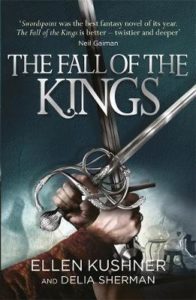I hate to damn The Fall of the Kings with faint praise because it’s fine, really it is. It’s just that this book follows the perfect Swordspoint and the extremely good The Privilege of the Sword, and while The Fall of the Kings is an interesting combination of a university novel in a fantastic setting with a possible crisis of legitimacy in the city that forms the setting, it pales in comparison to the other two.
The story mostly follows Theron Campion, a young nobleman, designated heir of the Duchy of Tremontaine, sometime student at the University, prone to great passions. The city is never named, though to readers of the series it has come to be known by the name of its original and now most raffish district, Riverside. At the time of Swordspoint, Riverside was a dangerous district; sixty years later in The Fall of the Kings it is still poor, but no longer a place where casual killings are common. Theron’s family maintains something of a residence there, an eccentric nest for eccentric nobles, knocked together from a row of houses. The Hill is where most nobles live and intrigue; the University forms another quarter, ranged with the Middle City of burghers and merchants and much else besides.
Kushner and Sherman introduce a young magister of the University, Basil St Cloud, who is breathing fresh life into the study of ancient history through the novel method of seeking out original sources, rather than following the accepted scholarly practice of interpreting canonical texts. He has enthusiastic academic followers, and of course he has scholarly rivals. As is the wont of medieval-ish universities, disputes spill into taverns and sometimes turn into brawls. St Cloud begins to draw the attention of the powers-that-be because his research touches on the founding acts of the city’s present political order.
Centuries past, kings from the North came down and, with wizards and companions at their side, intermarried with the nobility who ruled the South. They united the two halves of the land, which grew prosperous with the city as its center and capital. Over time, though, the kings grew increasingly erratic and the wizards’ power waned until eventually a noble rebellion, led by a Duke of Tremontaine, succeeded in binding all of the wizards and killing the last king. Since that time, nobles have ruled both city and countryside, North and South. The accepted wisdom is that the wizards were charlatans, the kings corrupt and eventually insane.
St Cloud’s work threatens to call that wisdom into question at a time when the North is restless and rumors of royalists run through the city. Theron himself begins to look like a potential plotter, although whether witting or unwitting remains unclear to those on the outside. From his own perspective, Theron is trying to discover who he is, to find the full depth of his love for St Cloud, and to lift some of what he feels is the dead hand of his family on his life.
On the academic side, St Cloud challenges one of his rivals to a public debate, a scholarly duel. St Cloud intends to defend the shocking proposition that magic was real. He had not intended for that to be the subject of the debate, but ideas ran ahead of his good sense, he was not in full command of his tongue. The narrative suggests that magic is at work in what St Cloud blurts out – he has by then acquired what purports to be a long-lost book of spells – but in both of these it was hard for me not to see the authorial hand rather than Fate at work, not least because in the first two books Riverside is set up as such a thoroughly non-magical world. The young scholars have their distinguishing features, but none is as compelling a character as Alec or St Veit from Swordspoint or Katherine from The Privilege of the Sword. Katherine and her long-time friend Marcus turn up in The Fall of the Kings as the current Duchess Tremontaine and her steward, a fusty pair from the old generation. I did not think that was true to Katherine at all, which is completely unfair because The Fall of the Kings was published before The Privilege of the Sword, but it definitely colored my perception of the characters’ interactions.
The book really picks up about three-fourths of the way through; Theron is in way over his head, and his piratical half-sister Jessica arrives from far ports. She’s livelier by far than the various scholars, intriguers, mystics, restorationists and sycophants who had to that point populated the pages of The Fall of the Kings. The last quarter of the book has the brio and panache that made the other two Riverside books so splendid. Finishing strongly is the best aspect of the book. Not everyone survives, not everyone gets the ending they deserve, but Kushner and Sherman tie the story’s strands together satisfyingly.

